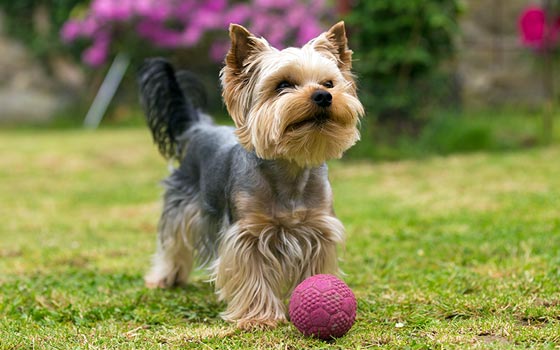Lifespan
11 to 16 years
By : Trupanion Staff | Updated Feb 16, 2024
Lifespan
11 to 16 years
Weight
4 - 12 pounds
Energy level
Mall walker
Breed Group
Toy

Yorkshire Terriers are a tiny breed, but they are full of personality. They have a gorgeous and silky coat when left to grow long, and they can rock a poofy topknot.
A Yorkshire Terrier might not understand quite how small they actually are — they are terriers after all! Full of vigor and with a feisty personality, this breed loves a challenge and is quite intelligent. Often subdued when meeting new people, Yorkies bond closely with their humans and are affectionate and cuddly with those they trust, if not a bit demanding of their attention.
Yorkies were originally developed during the mid-1800s in the county of Yorkshire in Northern England after Scottish weavers brought along their own Scottish terriers to live with them and work as ratters in their shops and factories. The breeds used in creating the Yorkshire Terrier aren’t known for sure, but it’s suspected that the Maltese was added to the mix to make the breed smaller, along with the Paisley Terrier (also known as the Clydesdale Terrier), a now-extinct Scottish breed, that gave the Yorkshire its long, lustrous coat. Shown along with other terrier breeds, the Yorkshire Terrier was recognized as a separate breed by the Kennel Club in 1886. This recognition helped the Yorkie transition from a working-class breed to a lapdog favorite of Victorian ladies, which contributed to the smaller size of the breed we see today.
As Americans embraced the Victorian ways of England, the Yorkshire Terrier made its way across the Atlantic, arriving in the United States in the early 1870s. The American Kennel Club recognized the Yorkshire Terrier in 1885, and the breed remained popular until the 1940s when small dogs fell out of favor for a while in the United States. The Yorkie has made a comeback over the last few decades, thanks to their wonderful plucky temperament, small size, lifelong puppy-like looks, and being carried as arm candy by the glitterati. They consistently rank in the top 10 most popular breeds in the United States.
Yorkshire Terriers were originally used as ratters, which required tenacity, high prey drive, and the ability to work independently. These aspects of the breed are still seen in modern-day Yorkshire Terriers. They make wonderful watchdogs and revel in their role as a cuddle buddy.
Yorkies are full of energy, and even though they’re small they can go-go-go! A couple of daily walks along with time for games help Yorkies stay in shape and burn off that terrier energy. Yorkies are known for their love of toys, so investing in some great size-appropriate fetch toys and stuffies will make playtime fun for both dog and human.
Their small size means they shouldn’t be jumping from heights such as furniture or out of the car, as it’s easy for them to injure themselves. Yorkies can even be seriously injured in jumps or a fall from their owner’s arms. They’ll appreciate easier access to their favorite couch nesting spots with a ramp or dog stairs, and they should be lifted in and out of cars and on and off furniture.
Yorkshire Terriers are quick-witted and love having a challenge to solve. Keep their brain engaged and sharp by joining training classes, dog sports, and providing lots of mental enrichment activities at home. Yorkies love food puzzles and interactive toys and excel in trick training!
Yorkies can be quite demanding, and often this is encouraged by human behavior. Because they are so small and absolutely adorable, many owners don’t invest the time in training and Yorkies learn that barking or other demanding behaviors get them what they want. Simply investing some time in positive reinforcement training and providing enough physical and mental exercise will help Yorkies learn polite manners and prevent unwanted behaviors.
Yorkshire Terriers, like many other toy breed puppies, might have issues with housebreaking and take longer than other breeds to become fully housetrained. Consistency throughout puppyhood, frequent potty breaks, and patience will help them be successful and prevent house soiling.
Yorkshire Terriers enjoy and excel in quite a few activities:
The Yorkshire Terrier has a smooth and silky single-layer coat. Similar to human hair, when left uncut it can grow up to two feet long!
Yorkies require daily brushing and regular grooming to keep their coat in tip-top shape, especially if kept long. Many Yorkie owners have a professional groomer clip the coat short for easier maintenance. Introduce your Yorkie puppy to grooming early to make their experiences positive and stress-free for everyone.
Best brush for a Yorkshire Terrier: Boar bristle brush, Slicker brush
Every Yorkie is unique, but their DNA does mean they may be at more risk for certain illnesses or other health conditions than other dog breeds. But don't worry! Understanding the types of health conditions your Yorkshire Terrier may be at great risk for can help you be a more prepared pet owner.
Always consult with your veterinarian if you are concerned about your dog's health. In the meantime, you can help protect your dog from unforeseen health conditions by signing up for a quality pet insurance plan.